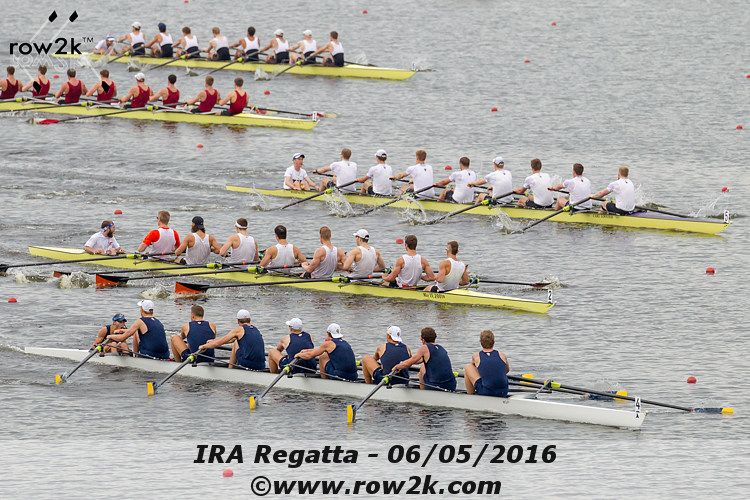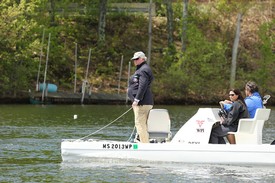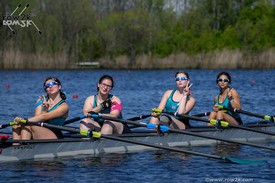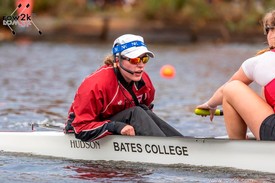The International Presence at U.S. Colleges (Part 1)
Ed Moran and Ed Hewitt, row2k.com

For an intro to the series, see Editors Note: row2k Series on the Intersection of U.S. Men's Collegiate and Elite Rowing
Nate Goodman had been a top scholastic rower with two stints on the US junior national team by the time he arrived at Yale University to find a boathouse full of many of the best collegiate athletes, not just from the U.S., but from around the world.
The Yale roster that fall of 2013 included top athletes from at least six countries: 18 Americans, two from Germany, two from GB, four from Australia, three from France and two from New Zealand.
"I was nervous," Goodman said.
"Not in the sense that these guys are better than me, but in the sense of how can I compete. There were a few leaders on the team, some of whom were American, some of whom were European. I thought, how can I pull those erg scores? How can I row that well?"
That would not be an unusual thought for any freshman in a top D1 rowing program in the U.S. If there are scholarships available, if the program is going to contend for a collegiate championship, if the school can guarantee a quality undergraduate education that sets the path to a successful future, then there is a world full of young international rowers who want to come to the U.S to row there.
Recruiting international rowers to compete for spots in the top collegiate varsity eights has been a common practice that began with a handful in the late 1980s and early 1990s to the point that today, in just about any top collegiate program, internationals occupy a significant number of the available seats in the top men's eights.

Consider the makeup of the IRA Grand Final in 2016, where of the 48 oarsmen (not including coxswains) in the race, only 19 were Americans (the breakdown in order of finish in the final: California 1, Yale 1, Princeton 4, Washington 3, Harvard 3, Brown 7). In 2015, the trend was underway, if to a lesser extent, with 27 Americans in the IRA Men's Eight Grand Final: Washington 4, Cal 3, Princeton 4, Brown 8, Harvard 5, Northeastern 3 (there were two Americans in the Yale crew that faltered in the semi and failed to make the A final).
Over the past two Olympic cycles, as the United States men's senior and Olympic teams struggled to gain positions on international podiums, the idea has taken hold that part of the reason for a lack of performance by the U.S. on the world stage has been that Americans are not prepared to compete when they graduate and join the senior teams.
Winning a seat in the top crews is difficult in the face of competition against hand-picked international recruits. And rowing in second and third varsity eights is not enough to develop an elite American senior team athlete, many in the U.S. rowing community believe.
That shared view, in the opinion of the several top collegiate coaches interviewed by row2k.com, while understandable, is not necessarily true.
"The two are not related," said Yale head coach Steve Gladstone who has been recruiting internationals to the collegiate programs he has coached for the at least the last 25 years, and might be said to have written the book on the practice.
"If people are trying to make that case that we will never be able to compete successfully internationally because the D1 programs in the United States are predominately populated by foreigners, I don't agree," said Gladstone.
"You get all these foreign kids that are highly developed in your program, and the American kids that are part of your program are going to benefit from being in the same boats and being in that environment in general. Having the internationals on your squad is not going to preclude their development to a senior team."
New Scrutiny
In the absence of a satisfactory performance by U.S. men's crews over the last eight years at the Olympic Games – one bronze medal in London, none in Rio – the system that guides men's rowing in the United States has come under the microscope.
And a large part of the conversation has been the development of American athletes in the U.S. college system – or the perceived lack of it.
There are many factors worth considering:
- Athletes who would have been in a varsity eight receiving the highest level of coaching and scrutiny might now be in second or third varsities, where the coaching may still be of very high quality, but perhaps not to the standard necessary to develop to an elite level
- Many international students are older than their counterparts from US schools, for varying reasons
- The disappearance of freshman racing, and frosh squads with a coach explicitly assigned to develop athletes, removed an avenue for athletes to develop without the pressures that come with racing in the varsity eight
- Rowing's longtime tradition of finding and developing walk-ons is fading
U.S. men's coach Bryan Volpenhein outlined some of the arguments:
"(American kids) get thrown right into the mix, or they get left out, and they don't develop fast enough," he said. "All the freshman their age that have rowed before in other countries become faster quicker, and move onto the varsity.
"(The Americans) might get a shot if they are given enough time. They might end up being better in four years, and beat those kids from Europe, but some are never going to find out. They think 'Nah, this isn't a lot of fun to just come here every day and row in a four or erg by myself and not knowing if I'm ever going to go race.' The Europeans are producing better kids right now. And the crazy thing is they are not even the best European kids. The best ones stay home and go for their national teams."

The Current Situation
The contention that international recruits - in general - are better and more suited to push a college program to the top quickly is hard to dispute. They come to the U.S. from cultures where rowing has a higher place in the top sports landscape where they more likely trained in smaller programs, have had more personalized coaching, started younger and in smaller boats, and developed better overall boat skills.
And, since 1956 when a Yale eight won Olympic gold one of eight collegiate crews that won at the Olympics the U.S. men's team, with the exception of 1964 and 2004, rowing has struggled to shine with the lights are brightest.
There have been periods of glory, including four world championships in the eight - 1997, 1998, 1999 and 2005, and Olympic gold in 2004 – but since the 2008 Beijing bronze medal eight, the U.S. has been roughed up. There have been medals at world championships, but also two world championship qualifiers that resulted in upheaval and unqualified crews.
In Rio, just one USRowing Training Center crew, the men's eight that finished fourth, reached an A final. And all that despite two full cycles of focusing on smaller boats, prioritizing the men's four and limiting resources to best serve a narrowed number of supported U.S. crews.
An ensuing Task Force review created tumult in the ranks of the national governing body USRowing, ultimately resulting in the resignation of four board members and CEO Glenn Merry stepping down under fire.
By The Numbers: International U.S. Collegiates in London and Rio
What does not quite appear to be entirely true is the existence of a direct connection between the U.S. men's performance over the last eight years and the recruitment of internationals at top D1 schools.
There may not be even a direct connection between the winning men's crews in Rio and international collegiate athletes moving from their schools to their respective national teams.
Of the 2016 national championship Cal crew, only Polish single sculler and Natan Wegrzyki-Szymczyk rowed in Rio, where he finished seventh in the single.
Of the British eight that won, all came from the British system; in fact, no US-educated British athlete has ever made the British senior men's team.
The Canadian men's squad did include a few US-educated athletes, including Colin McCabe, Rob Gibson, Will Dean, and Will Crothers; Olivier Siegelaar from the Dutch team and Marko Marjonvic from the Serbian double rowed at Cal; and Princeton grad Tim Masters was in the Australian men's eight that missed qualifying for Rio at the Final Qualification Regatta.
With 334 men competing in rowing in Rio, these numbers do not point to a large-scale domination of collegiate rowers in the international ranks.
In 2012, there were about a dozen US-educated male athletes rowing for other countries, a very small percentage of the 353 men who competed.
The ranks of many other sports are packed with internationals without a corresponding decline in improvement opportunities for US athletes; in just the Pac-12 for example, 55 athletes from the U.S. and around the world won a total of 55 Olympic medals in 12 different sports for five different countries. See this list of medals captured by Pac-12 athletes, which shows considerable representation across many sports, while this complete list of Pac-12 athletes in Rio shows a similar trend.
Among those Pac-12 ranks are Rob Munn and Ambrose Puttmann, both of whom rowed in the Washington 2V at a time when the UW squad was tremendously deep, but who also went on to row on US teams, both at the U23 and senior level; both won gold in the U23 men's eight in 2012, and Munn rowed in the 2016 US men's Olympic eight.
Also somewhat anecdotally, the presence of internationals in U.S. collegiate women's boats has not hurt the U.S. women's squad; in the 2015 NCAA Varsity 8 final, only four Americans were in the top two eights from Ohio State and Cal; third-place Virginia was an all-American crew.
Furthermore, while internationals have been at U.S. colleges for some time, the powerful flood of internationals into the U.S. collegiate system is a relatively new phenomenon that arguably post-dates struggles at the elite level. While these observations and data are not proof that having internationals in the top eights is a root cause of, the case for causation is weaker than might be at first.
For heaps more data and perhaps a contrasting view on the topic, see Carlo Zezza's book Boys in a Box: Why our top college crews are rowed by foreigners, Why our men won no medals at the Rio Olympics, and What we can do about it.
The U.S. Collegiate View
There is not a single collegiate coach – from a Division I, or club program – that does not see winning as their top priority. More to the point, it is not the job of the U.S. collegiate system to produce U.S. national oarsmen.
Top international recruits, collegiate coaches argue, are better positioned because of the sports culture from their native countries and the programs and systems they train in to come to a program and have an immediate impact on a top varsity eight.
A top collegiate program's main mission is winning, and in every sport recruiting foreign athletes to compete is something done across the board.
Gregg Hartsuff, who coaches a top men's collegiate club program at the University of Michigan, would love to have to contend with this issue. "If I were the coach of a Division I program with scholarships, I would be hunting for talent and turning over every stone as well," said Hartsuff, who was a member of the USRowing study task force.
"I don't have an issue with internationals competing in all of our varsity eights. I would be doing the same thing. I'm paid to win. So, I don't have an issue with it."

Gladstone, and Cal coach and former U.S. Olympic and national team men's coach Mike Teti, say the same thing.
"Your objective is to win the races," Gladstone said. "And in the process of endeavoring to win the races, you have the parallel growth of the spirit of the person involved. But it has always been the objective to win the races; to be as good as you can be and to win the games."
Teti put it this way: "If I don't produce, I get fired."
Very few people in American rowing fault these coaches for recruiting internationals.
"They all know they need to recruit internationals," said Volpenhein. "They all need the best rowers they can get. So they are doing what anyone would do. I do not blame them, or anyone, for doing that.
"That's what they should do, go out and recruit the best athletes. In the end, those better athletes should push the American kids to a higher level. That's how it should work. So I don't see any sense in limiting recruiting or saying you can't do this, you can only recruit American kids."
Collegiate coaches agree with Volpenhein's assessment that international recruits will push the American kids. It forces them to work and compete harder daily to contend for the top seats, which should make recruiting internationally a plus for the U.S. system, not a drain.
The American Experience
With all Goodman's early success in the U.S. system, the Montclair, N.J. native, was equipped to compete for the varsity eight in his first year, even if he was nervous in his first days as a freshman.
But he was "a little too cocky for my own good," he recalls. "I got beaten in a lot of ways very quickly and I remember thinking to myself, how am I going to do what they are doing? I've got to be better."
To be specific, Goodman was not just referring to the internationals in the program, but the top Americans as well. He rowed in the second varsity eight that year and then moved to the top varsity crew in his second year. He has been part of and stroked a very competitive and successful eight since.
It could be argued that Goodman would have made that jump to the top crew anyway, but in his opinion, his overall development was moved forward, and faster, by having top international athletes to challenge and teach him.
"I really like having internationals on the team," he said. "I think it raises the standard at Yale. I had to be better than I would have been if we were an all American team simply because there are more people, and a wider range of athletes to draw from.
"I would argue that having teams pick up the best guys from around the world makes the Americans on the team more prepared. I certainly feel more prepared to compete for the U.S. as a virtue of having rowed with the guys that I rowed with at Yale.
"We're exposed to more ideas. Every guy that comes into the program has an influence on how things happen, an influence on the team culture," he said.
"We had a bunch of German guys and they left their mark and we tried to take the lessons from German rowing to help us improve. Right now, we have British guys and we're trying to take their experiences on the British team and learn from them. And the American guys, too. We try to take the lessons from what has gone well, and what has not gone well, rowing for the U.S."
Last summer, Goodman earned a spot on the U.S. under 23 eight that finished 10th at the world championships. He has been communicating with the training center coaches and is hoping that, following this last year at Yale, he will be invited to be part of the U.S Princeton Training Center, and to find a way to row in Tokyo.
He is not deterred, he said, by a collegiate system that recruits top internationals that row in the varsity eights at the IRAs and Goodman believes that he is in a good position and has the time to develop into a top, international level athlete. He also believes there are enough just like him in the U.S.
Are the U.S. athletes out there?
That ultimately seems to be the question.
The answer, collegiate and U.S. coaches say, is yes - without question. Over the subsequent installments of this series, we will talk about who they are and where they row, and then outline where they believe we can find them, how to get them involved, and how to keep them interested in rowing for their country; stay tuned.
If you enjoy and rely on row2k, we need your help to be able to keep doing all this. Though row2k sometimes looks like a big, outside-funded operation, it mainly runs on enthusiasm and grit. Help us keep it coming, thank you! Learn more.
Comments | Log in to comment |
- Bont Rowing
- Calm Waters Rowing
- Concept 2
- Craftsbury Sculling
- The Crew Classic
- CrewLAB
- Croker
- Dad Vail Regatta
- Durham Boat Co.
- Empacher
- Faster Masters
- Filippi
- Fluidesign
- h2row.net
- HUDSON
- Live2Row Studios
- Nielsen-Kellerman
- Oak Ridge RA
- Peinert Boat Works
- Pocock Racing Shells
- Race1 USA
- Rockland Rowing Masters Regatta
- RowKraft
- Rubini Jewelers
- Vespoli USA
- WinTech Racing
- Bont Rowing
- Calm Waters Rowing
- Concept 2
- Craftsbury Sculling
- The Crew Classic
- CrewLAB
- Croker
- Dad Vail Regatta
- Durham Boat Co.
- Empacher
- Faster Masters
- Filippi
- Fluidesign
- h2row.net
- HUDSON
- Live2Row Studios
- Nielsen-Kellerman
- Oak Ridge RA
- Peinert Boat Works
- Pocock Racing Shells
- Race1 USA
- Rockland Rowing Masters Regatta
- RowKraft
- Rubini Jewelers
- Vespoli USA
- WinTech Racing

















03/09/2017 12:07:16 AM
02/28/2017 11:28:26 AM
02/23/2017 3:13:38 PM
02/24/2017 7:32:49 AM
02/23/2017 1:55:21 PM
With that I mean athletic departments maybe not taking the men's teams as seriously, programs being demoted to club teams, the general public not understanding why men's rowing isn't an NCAA sport (Heck, if it ain't NCAA it must not be a varsity sport...why would I want to pursue that?)...I've literally had someone tell me that rowing isn't a varsity sport at Wisco because it doesn't show up on the Big 10 website...I told them to try visiting the Wisco Athletics page instead, and (not trying to ruffle feathers here, just stating how our society often works) some young men and others possibly perceiving rowing to be a "girls" sport since only women's rowing is an NCAA sport (hey, I wish everyone could row like our US women's team...they rock).
There definitely seems to be a positive relationship with the rise of US Women's Rowing and joining the NCAA / Title IX stuff (no kidding as tons of college varsity teams and opportunities were created) while at the same time there's been an inverse relationship for men's rowing staying out of the NCAA as the US men's team has been less successful.
I'm not necessarily advocating for men's rowing to join the NCAA, simply asking the question since people are trying to figure out the decline in US Men's results. Have to put everything on the table.
02/23/2017 2:17:35 PM
02/23/2017 12:42:04 PM
02/23/2017 12:12:57 PM
02/22/2017 11:48:55 PM
02/22/2017 6:54:21 PM
02/22/2017 4:04:25 PM
02/22/2017 3:33:11 PM
02/22/2017 3:35:18 PM
02/22/2017 2:59:24 PM
Seems like our first coaches have a lot of responsibility!!
02/22/2017 1:56:24 PM